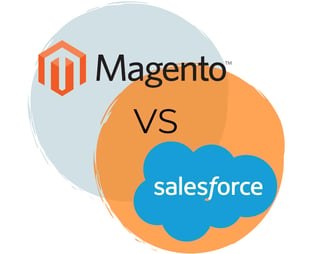Adobe Commerce Powered by Magento vs Salesforce Commerce Cloud
Are you looking for an eCommerce platform for your business?
It is no secret that the right eCommerce platform can drastically reshape how you do business; according to Adobe, global consumer digital commerce is on an astounding growth track, and this isn’t just individual consumers, B2B eCommerce revenue is growing at an equally striking rate.

Starting to look at eCommerce platforms can feel overwhelming. Between the standard features that come with base software and the various extensions offered it can be difficult to decide which options will best align with your business needs and goals.
To help break things down we're comparing our long-time partner, Magento, now Adobe Commerce to other major eCommerce platforms. In this blog, we'll be focusing specifically on Magento vs Salesforce Commerce Cloud.
Adobe Commerce
Adobe Commerce has a long list of strengths. Adobe Commerce allows B2B, B2C, and B2B2C to sell a single instance of the software - change to Adobe Commerce allows you to set up and administer B2B, B2C, and B2B2C sites from a single instance of the software. This is a huge advantage... as you are only managing one platform. This is a huge advantage for sellers who are looking to expand into diverse selling spaces. It is also flexible and extensible and pliable at every level, including front-end development. Another great feature is Adobe Commerce's ability to extend and customize core applications and cloud development options.
As an open, API-first platform Adobe Commerce supports the needs of modern businesses and unique shopper experiences. It combines headless architecture, full customizability, and a choice of on-premise or cloud hosting. It also has an extensive marketplace of add-on solutions to give merchants complete control over their experience.
This is furthered by its ease of use. It offers drag-and-drop tools to help quickly create compelling content and shopping experiences without the need for developer support. Adobe Commerce also uses AI-powered product recommendations and searches to personalize the buying experience for your customers.
It should be noted that as a cloud-based platform, Adobe Commerce cannot auto-scale in the way that Salesforce can. It can also be difficult for novices to navigate and you will likely need an experienced or certified developer to help launch and support your site.
Possibly most importantly, Adobe Commerce can help lower the total cost of ownership. As a platform-as-a-service offering, it enables rapid deployment of fully customizable, more secure, and scalable web storefronts.
Adobe Commerce has a comprehensive feature set, an extensive solution partner base, and a strong developer community. Overall, merchants are able to launch Adobe Commerce faster and for lower implementation budgets than compared to other platforms.
Salesforce Commerce Cloud
Salesforce Commerce Cloud is a cloud-based service for unifying the way businesses engage with customers over any channel or device.
While Salesforce Commerce Cloud has a lot of strengths, there are some cons to the platforms. Salesforce Commerce Cloud works off a closed architecture with a legacy code base, limiting its ability to extend. It also doesn't allow merchants to sell both B2B and B2C on a single instance so companies needing both capabilities would be forced to purchase separate software in order to sell in both spaces.
That being said, Salesforce has a laundry list of strengths as well. Salesforce uses multi-tenant Saas, which simplifies operations. It is stable and auto-scales to handle large volumes, providing up to 99.99% uptime.
Compared to Adobe Commerce, Salesforce Commerce Cloud is a more novice-friendly platform. Salesforce Commerce Cloud offers an intuitive user interface that is easy for non-technical people to navigate and create pages. Because it is less developer-driven, Salesforce Commerce cloud doesn't require as much maintenance as a Magento site may, ridding you of the need and cost of developer support.
Salesforce is a fully customizable platform. From the UX check-out experience to the client homepage design, everything can be customized to promote company branding and product promotion.
Salesforce Commerce Cloud has a strong library of third-party extensions though they do get technical and an integration developer would be helpful to ensure the integration is timely and seamless with the rest of your eCommerce site.
Lastly, Salesforce has a mobile app. Its cloud-based system offers mobile applications to its merchants to simplify their work. It helps manage the CRM from mobile devices like smartphones, tablets, etc.
The reality is that there are strengths and weaknesses to every eCommerce platform you will consider. When considering which platform will work best for your business, it is important to weigh those strengths and weaknesses in relation to the needs and goals of your business.

